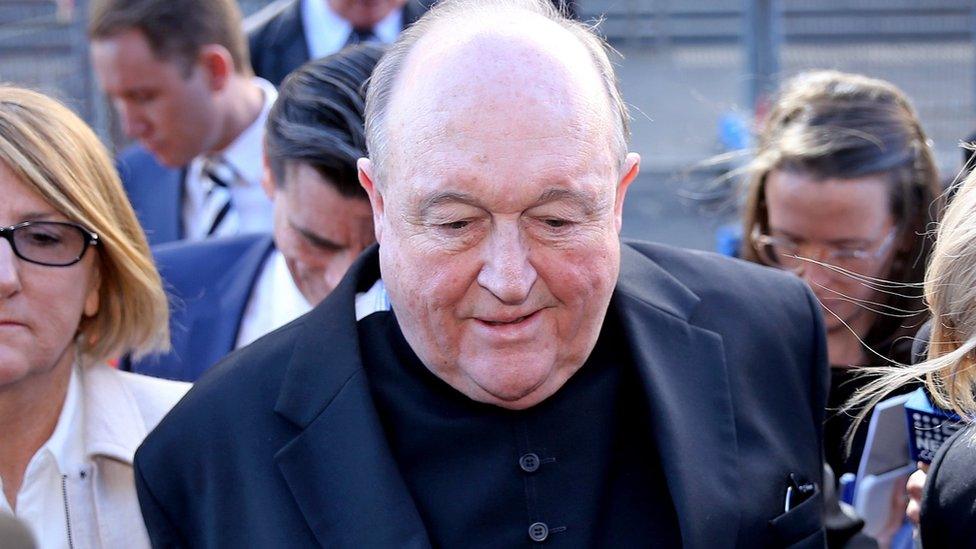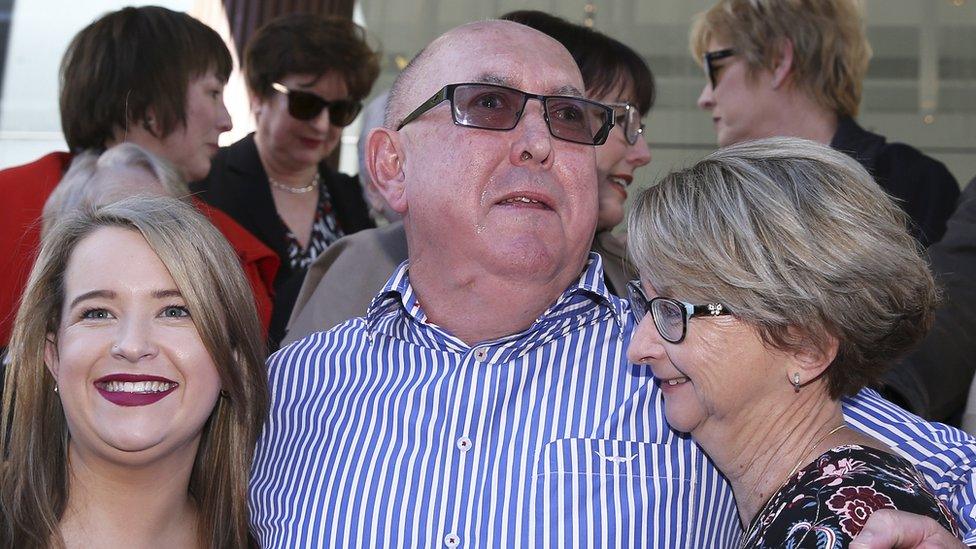Archbishop Philip Wilson sentenced for concealing child sex abuse
- Published

Archbishop Philip Wilson was convicted in May
A Catholic archbishop in Australia has been given a maximum sentence of 12 months in detention for concealing child sexual abuse in the 1970s.
Philip Wilson, now archbishop of Adelaide, is the most senior Catholic globally to be convicted of the crime.
He was found guilty by a court last month of covering up abuse by a paedophile priest in New South Wales.
On Tuesday, the court ordered Wilson to be assessed for "home detention" - meaning he will probably avoid jail.
Magistrate Robert Stone said the senior clergyman had shown "no remorse or contrition". He will be eligible for parole after six months.
Wilson has not resigned as archbishop, despite relinquishing his duties in the wake of his conviction.
In May, a court found he had failed to report his colleague James Patrick Fletcher's abuse of altar boys to police.
'Wilson ignored my story for decades'
Wilson, then a junior priest in the Maitland region, had dismissed young victims in a bid to protect the Church's reputation, Magistrate Stone ruled.
Fletcher was convicted of nine child sexual abuse charges in 2004, and died in jail two years later.
What did the court hear?
During his trial, Wilson denied that he had known about Fletcher's actions.
The archbishop's lawyers had sought to have the case thrown out on four occasions, citing the 67-year-old's diagnosis with Alzheimer's disease.
One of his victims, former altar boy Peter Creigh, told the court he had described the abuse to Wilson in detail in 1976, five years after it took place.
Magistrate Stone rejected Wilson's claims that he had no memory of the conversation, and said he had found Mr Creigh to be a reliable witness.
Another victim, who cannot be named, testified that Wilson had told him he was telling lies, and to recite 10 Hail Mary prayers as punishment.
What has been the reaction?
Survivors of abuse said they had mixed feelings about the sentence. One, Peter Gogarty, said it was "probably letting [Wilson] off a little bit too lightly".
However, Mr Gogarty said: "We have made history here in Australia.
"The highest-ranking church official to ever be brought to account [for] what we know was a worldwide, systematic abuse of children and the concealment of that abuse."
Mr Creigh did not attend the hearing on Tuesday due to health reasons.
But earlier he told the Adelaide Advertiser, external that "irrespective of the sentencing, the victory was had" in May when Wilson was convicted.
The Australian Catholic Bishops Conference said it hoped that the sentence would "bring some sense of peace" to Fletcher's victims. It added that the Church had made "substantial changes" to prevent abuse and its concealment.

Detention, but no resignation
Hywel Griffith, BBC News, Sydney
Inside the crowded courtroom, survivors and their families listened studiously as the magistrate delivered his decision.
There were gasps as Magistrate Stone said only a period of imprisonment would suffice, then disappointment at the prospect of home detention.
The sentence is significant - it means a senior Church figure could be made to wear an electronic tag, no longer free to go where he wants.
But what angers some victims is that the Church has refused to disown Philip Wilson, and that he holds on to his role as one of its leaders.

How has Australia been handling such cases?
In 2012, then Prime Minister Julia Gillard set up a royal commission, the country's highest form of public inquiry, to look into institutional responses to child sexual abuse.
By the time it had published its final report in December last year, it had handled 42,000 calls and referred more than 2,500 cases to the authorities.
It said institutions including churches, schools and sports clubs had "seriously failed" to protect children. Catholic institutions came in for particular criticism.

Mr Creigh reacts after Wilson was convicted in May
Prime Minister Malcolm Turnbull said "a national tragedy" had been exposed.
How does this compare to convictions elsewhere?
The first cases of molestation by priests came to light in the 1980s. In the 1990s, revelations began of widespread abuse in Ireland, with cases spreading to more than a dozen countries this century.
Ireland, the US and Australia have carried out national inquiries, and there have been cover-up scandals such as in the Archdiocese of Boston in the US.
Although there have been convictions of priests for sexual abuse, in many cases accused clergymen were either moved or retired by their Church, with financial settlements agreed in some cases, particularly in the US.
Victims rights groups have complained the convictions do not often extend beyond priest level, with few senior figures brought to account, although a number have left their positions over their actions in sexual abuse cases, including Cardinal Bernard Law in Boston.
One of the most high-profile recent cases has been in Chile. All of its 34 Catholic bishops offered to resign. Pope Francis had handed them a 10-page document accusing Chile's Church hierarchy of negligence in sexual abuse cases.